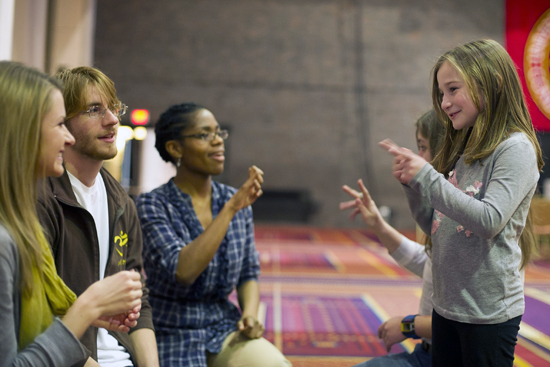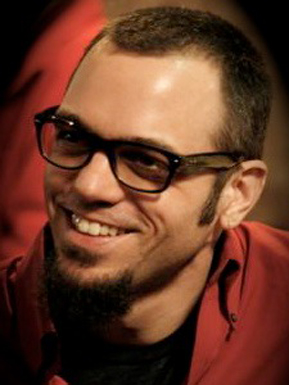Should the Deaf Be Considered an Ethnic Group?
Med Prof, co-authors bolster case for culturally distinct “Deaf World”

Deaf Americans who sign share much more than a language; they comprise a common culture with its own ancestry, art, and humor. A recent book titled The People of the Eye, coauthored by Richard C. Pillard, a School of Medicine professor of psychiatry, goes further, offering a compelling argument that the deaf should be recognized as a distinct ethnic group.
Subtitled Deaf Ethnicity and Ancestry, the book’s other authors are Harlan Lane, a hearing professor of psychology at Northeastern University, and Ulf Hedberg, a deaf-from-birth archivist at Gallaudet University, the nation’s oldest college for the deaf. Published recently by Oxford University Press, the book grew out of a 40-year friendship between psycholinguist Lane and Pillard, a clinician captivated by genetics. “We won’t call deafness a disorder; in fact we never use the word ‘deafness’ in the book,” says Pillard (below), who hopes the slim, heavily footnoted volume will help convince hearing people that not only is being deaf not a catastrophe, but “deaf people get along perfectly fine in the world and they have for centuries.”
Jason Norman agrees. A sign in the School of Education Deaf Studies program offices designates the area as an American Sign Language–only zone. A curriculum and teaching instructor in the program, Norman says, through an ASL interpreter, that for him, being a deaf person trumps any other aspect of his identity, and he and other ASL speakers share deaf jokes, deaf ways of attracting attention, and a powerful cultural bond. “It is not a disability to me in any way to be deaf,” says the ASL poet and storyteller, who joined SED last August. Born to hearing parents who learned to sign, he’s “very accustomed to interacting in a hearing world,” he says. “I feel quite comfortable among hearing people. But when you can’t sign for days on end, you feel like you’re going to go out of your skin without the oasis of ASL.” Norman has attended both deaf-only and mainstream schools.
But beyond being the means of communication for the deaf, ASL has a rich literature that includes “history, stories, tall tales, legends, fables, anecdotes, poetry, plays, humor, naming rituals, sign play, and more,” Pillard and his coauthors write. And deaf theater has its own conventions, which encompass choreography, mime, and the artistic use of ASL.
Like other ethnic groups, the deaf, to a large and verifiable extent, share a biological bond as well. By tracing deaf people in America to colonists from Weald, England, who famously populated an area on Martha’s Vineyard, Pillard makes a strong case for a shared deaf ancestry. The book meticulously charts the ancestry of the island colony as well as of deaf clusters in New Hampshire and Maine. “Ethnicity is family writ large,” says Pillard, who with Lane traced a group of deaf people back to the 1500s.
While there are many genes contributing to deafness, the western world has seen a dramatic decline in deafness caused by diseases such as meningitis and scarlet fever. Outside of the elderly, most deaf people in America today are either extremely hearing-impaired or deaf from birth. And more and more, the deaf identify with what they call “the Deaf World,” Pillard says. Not a place but a mindset, it is a shared heritage and language—functionally, an ethnic group. The Deaf World may lack a cuisine, say the authors of The People of the Eye, but like other ethnic groups, it thrives in family life, and outside the home in ethnic associations, sports events, ASL-interpreted religious services, cruises, senior citizen clubs, and recreational associations, even as the expansion of Deaf World has made traditional, marginalized deaf clubs superfluous.
The authors argue that being identified as an ethnic group would afford the deaf not just a greater respect, and in some cases the protections of the law, but could finally dispel the assumption that deaf people consider themselves handicapped or as failing to meet an accepted physical ideal of wholeness and health.
They point to an ongoing transition from a world where deaf people live in isolation to one where they enjoy a rich cultural identity. But the media have trailed behind, says Norman, with TV shows from Heroes to Seinfeld presenting deaf people for the most part as expert lip readers who often speak. That is akin to a racial slur, he adds. “The power of the media can’t be underestimated.” He believes in the transformative power of film, which can enlighten without being pedantic.
Michael Bruffee (CAS’11), a hearing former ASL student of Norman’s, often finds himself gently correcting hearing friends’ misconceptions about deaf culture. “They think there’s a universal sign language,” he says, “and I say, is there one universal spoken language?” And there was the hearing friend who could not understand why Gallaudet University students protested against the school’s hiring a hearing person as president. “Imagine,” he says, “if BU hired a president who needed an interpreter to speak English. We can’t imagine that, and that’s what deaf people deal with.” Bruffee hopes to work in deaf education or as an interpreter.
As much as he endorses the concept, Pillard acknowledges several potential problems in categorizing deaf ASL users as an ethnic group. For one thing, most deaf people are elderly or became deaf later in life and are far more likely to use hearing aids than embrace ASL as another way to communicate. Identifying throughout their lives as hearing people, they may now indeed consider themselves handicapped. Also, while deaf people are in reality “no more disabled than a Ukrainian speaker would be in this country,” he says, the deaf qualify under the law as disabled, and if benefits are provided, they take the money. “You can’t have it both ways. Either you’re disabled or you ain’t.”
Another divisive issue in the debate is the rise of cochlear implants among the deaf or hearing-impaired. An article in the New England Journal of Medicine suggests that newborns be screened for hearing, and if they’re found to have profound hearing loss, doctors should consider surgical cochlear implants. While infants are incapable of informed consent, “technology rolls over the ethical arguments,” Pillard says. “Doctors say it’s best to do it early, so what’s a parent to think?”
For people unfamiliar with them, the implants sound like a medical marvel. But they are problematic, he says. “They work poorly, and that’s something worth emphasizing. You get 24 channels for different octaves and tonal recognition, but the price you pay for that is you’re a kid trying to play soccer and so on with this business strapped to your body.” And the implants, designed to be optimal when used in both ears, destroy residual hearing in people who were not completely deaf before the implants. “It seems to me that what we’re doing is transforming someone who could have a perfectly healthy ethnic identity and turning him into a marginalized kid who can’t speak or hear well, but could learn to sign beautifully,” Pillard says.
 Norman (left) says that cochlear implants are a “complex and thorny issue.” He doesn’t oppose the technology (“It’s just technology, so it’s neutral”), but wishes doctors would make options clearer to parents, informing them that kids fluent in ASL can excel and enjoy life and community in every way without invasive surgery. “If you do almost nothing but train to listen and speak, you may learn to speak well” with implants, he says, “but you may not be a social being.”
Norman (left) says that cochlear implants are a “complex and thorny issue.” He doesn’t oppose the technology (“It’s just technology, so it’s neutral”), but wishes doctors would make options clearer to parents, informing them that kids fluent in ASL can excel and enjoy life and community in every way without invasive surgery. “If you do almost nothing but train to listen and speak, you may learn to speak well” with implants, he says, “but you may not be a social being.”
Aside from the polarizing issue of implants, the Deaf World ethnicity concept is not without critics. Writing in a collection of scholarly essays titled Open Your Eyes: Deaf Studies Talking, Lennard J. Davis warns that the ethnic model is dubious because it feeds divisiveness, and “because of the association now between ethnic groups and violence.” Others express concerns about the Deaf World label being too polarizing or forcing an identity on sign language users who are hard of hearing and also speak or on those who become deaf later in life.
At the conclusion of People of the Eye, the authors reflect on what they call the ethnic “conceptualization” of the Deaf World. They ask, “Are ASL signers simply hearing people manqués, most of them beset by a genetic mutation passed on through intermarriage, or are they members of an ethnic group whose common descent, language, and culture can be traced against generations?” Being recognized as an ethnic group would be a “powerful force” in acceptance of the Deaf World, they say. And they’re not just speaking of subjective changes; the ethics of, and standards for, treatment of ethnic minorities is spelled out by the United Nations in its Declaration on the Rights of Persons Belonging to National or Ethnic, Religious and Linguistic Minorities.
Pillard and his coauthors are bracing for, and welcome, lively debate on the subject.
Susan Seligson can be reached at sueselig@bu.edu.

Comments & Discussion
Boston University moderates comments to facilitate an informed, substantive, civil conversation. Abusive, profane, self-promotional, misleading, incoherent or off-topic comments will be rejected. Moderators are staffed during regular business hours (EST) and can only accept comments written in English. Statistics or facts must include a citation or a link to the citation.